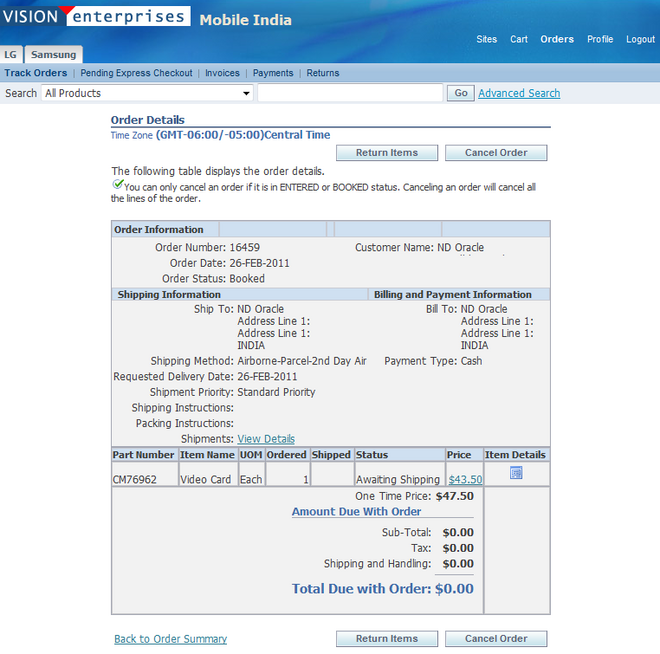Order Returns

Oracle iStore's Returns feature allows both B2B and B2C users to return items from orders placed. In today's e-commerce environment, accepting return items in Web stores is standard functionality. Providing returns functionality both reduces the cost of doing business for merchants, and provides a invaluable step toward a complete customer self-service orientation.
To address this business requirement, Oracle iStore provides Returns functionality in the Customer Application. Using the Orders menu in the Customer Application, customers can initiate returns for orders which are in Booked or Closed status in Oracle Order Management. If an approval process is being used, an administrator can use Oracle Order Management to evaluate the returns, and either approve or reject the returns. Merchants can set up returns with or without Oracle Workflow approval mechanisms in place.
The following is a high-level Returns flow:
1. To initiate a return (also known as a Return Material Authorization, or RMA), customers select applicable items, specifying the return quantities and return reasons.
2. After the customer submits the RMA, Oracle iStore automatically sends a confirmation e-mail notification to the customer.
3. Once Oracle Order Management processes the return order, the appropriate e-mail notification is sent to the user, notifying him whether the RMA has been approved or not (if approvals are being used). For approved RMAs, merchants can set up a return location to be sent in the e-mail notification.
4. After an RMA is approved, on the back end, Oracle Purchasing and Oracle Accounts Receivable work to complete the RMA processing, by fulfilling the order lines and generating credit memos.
5. RMAs are then available for the customer to track in Order Tracker.
The following functionality exists wit Oracle Order Management Release 11.5.10:
1. Merchants can implement pre-booking approval processes for returns.
2. The status of pending returns is User Working (regardless of whether pre-booking approval processes are being used). Return orders in Entered/User Working status are always part of a user's pending returns queue. These cannot be tracked as submitted orders in the Returns pages.
3. When the user submits the return (clicks Submit Return button):
• If an Approval List has been set up in Order Management:
--Order status moves from User Working to Pending Internal Approval
--User will be able to see the returns in Pending Internal Approval status in the Returns subtab
--Based on the approver's action, the return then moves to Booked or Rejected status.
• If an Approval List has not been set up in Order Management, then the order status moves to Booked status.
4. Any errors from validations being done from Oracle iStore will show up in the Oracle iStore UI after the user adds the items to the return order (in the Create Return: Review and Submit page), prior to submission. Additionally, the error messages that display are more detailed than pre-Release 11.5.10 versions of Oracle Order Management.
5. E-mail notifications support --- Since Oracle iStore return orders are created with a transaction type having an order flow of "Order Flow - Return with Submission and Approval", when a return is Booked (irrespective of whether approval is setup or not), Oracle Order Management calls Oracle iStore to send an approval or rejection notification to the customer. Oracle iStore seeds two notifications for this purpose:
Return Order Approval and Return Order Rejection. See the chapter, "Integrating Oracle iStore with Oracle Workflow", for details.
Note: If you are using Oracle iStore Release 11.5.10 with Oracle Order Management Release 11.5.10, set the profile option, IBE: Enable Return Pre-booking Approval, to enable the pre-booking approval process in Oracle Order Management.
thanks for the information
thanks for the information about mail order returns. its really helpful....